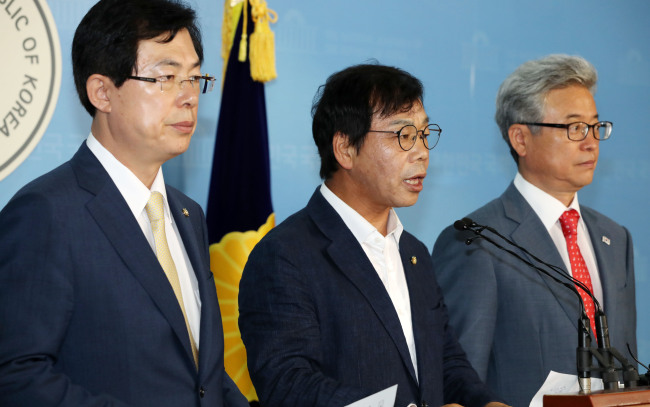The government’s decision to deploy a U.S. advanced missile system in the southern part of South Korea has sparked backlash from ruling party lawmakers elected in the region, challenging the Saenuri Party’s leadership that supports the plan.
The Saenuri Party lawmakers, whose constituencies are in Daegu and North Gyeongsang Province, issued a statement Wednesday, denouncing the government for choosing Seongju county, North Gyeongsang Province, as a location for the Terminal High Altitude Area Defense artillery.
The dissent is likely to complicate the conservative party’s position on the sensitive issue, as the Saenuri leadership has been urging the opposing lawmakers to set aside regional interests and endorse the security-related decision.
 |
The Saenuri Party’s Rep. Yi Wan-young (center) holds a press conference on the government’s decision to deploy THAAD in Seongju, North Gyeongsang Province, Wednesday. Park Hae-mook/The Korea Herald |
“The residents in the region are expressing their anger and anxiety over the decision to deploy THAAD here,” said Rep. Yi Wan-young, a second-term lawmaker who represents Seongju and nearby counties. “(The government) should offer proper explanation for deploying THADD in our neighborhood,” he said.
The statement was signed by 21 lawmakers from the southern region who said they agree with THAAD but not to its deployment in their constituencies. There are 25 lawmakers representing the region. The other four have either opposed the plan altogether or reserved their positions.
The lawmakers demanded the government reveal its standards and procedures for choosing the region. They also urged military and defense agencies to communicate more with residents before pushing ahead with the plan.
The government’s disputed decision on THAAD has placed ruling party lawmakers in a tight spot, as they in principle agree with the need for the deployment, but not to have it in their constituency, as there is widespread public perception that the system could bring negative environmental and health impacts.
For instance, the Saenuri Party’s prominent member Rep. Choi Kyung-hwan, who endorses the THAAD deployment, said on Friday that he opposed the idea of the Southern region housing an artillery unit for THAAD and that he had relayed his opposition to President Park Geun-hye.
The four-term lawmaker warned that the move would make the conservative party lose more support from conservative residents, who were also recently outraged over another decision by the government to forgo building a new airport in the southeast region.
The party leadership, on the other hand, has remained resolute, with Saenuri floor leader Rep. Chung Jin-suk dismissing the opposition. The party’s spokesman Rep. Ji Sang-wuk issued a statement on Wednesday following the government’s announcement of the decision to locate THAAD artillery at Seongju county.
“(THAAD deployment) is a decision made to promote national interest and security,” said the floor leader during a party meeting on Monday. “Residents (in the southern region) should look at the big picture and their representatives should refrain from sparking conflict in the issue,” he added.
It is not the first time that a government-led security policy has been embroiled in political controversy. In 2011, the Defense Ministry’s plan to build a naval base on Jejudo Island faced vehement opposition from the residents.
Chung Sang-jin, a sociology professor at Sogang University, said that the gvernment should put more effort into communicating with residents on their decisions.
“Admittedly, some security policy is hard to sell to all the people. The problem is whether Korea’s power elites are perceived as competent and reliable enough to make such an important decision and willing to be held accountable for their decision,” he said.
By Yeo Jun-suk(
jasonyeo@heraldcorp.com)








